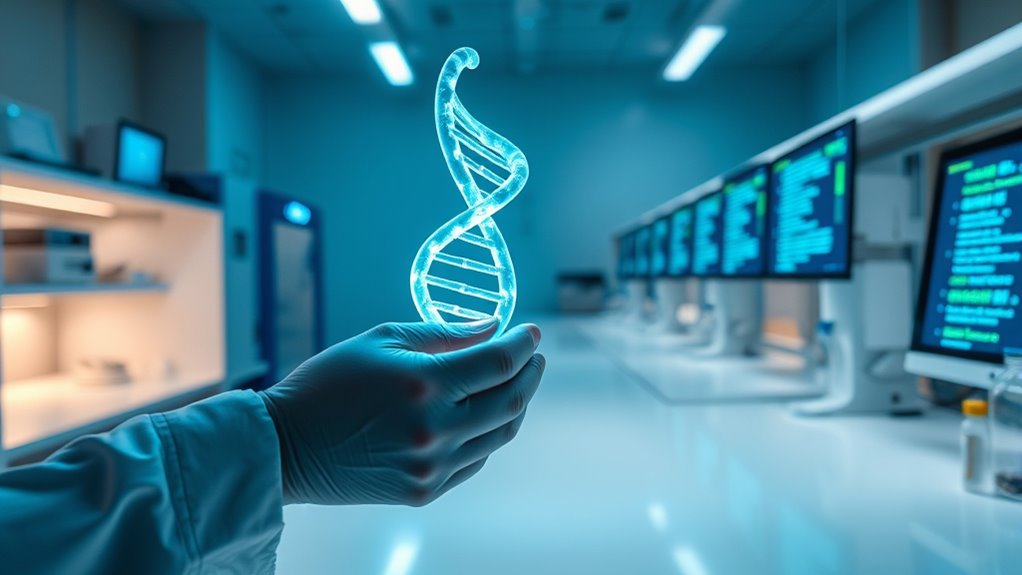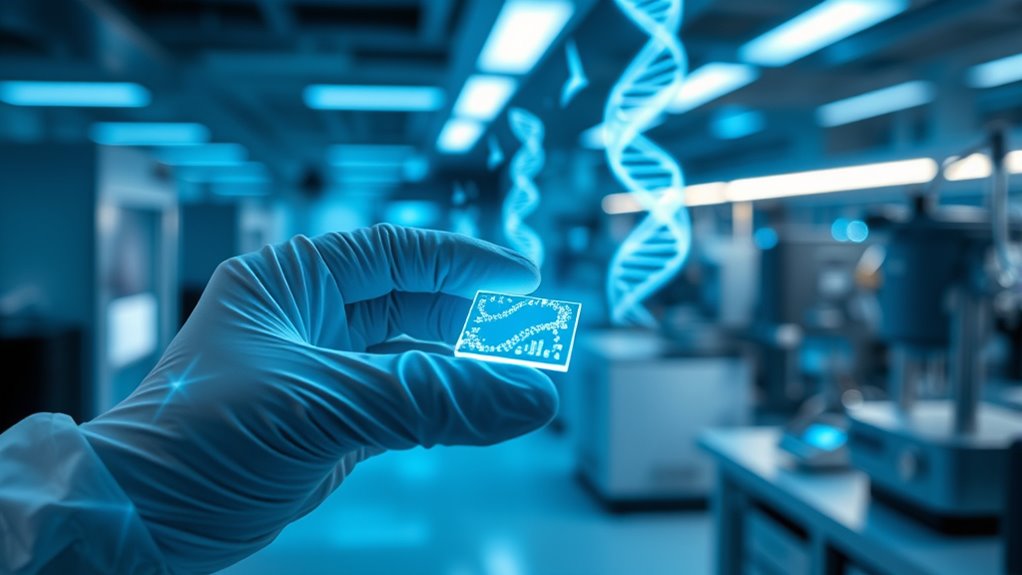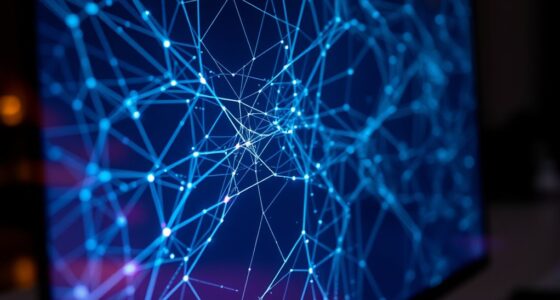The ethics of gene editing and CRISPR technology involve weighing potential medical benefits against moral concerns. You should consider how editing human DNA could prevent genetic diseases, but also raises questions about creating “designer babies” and reducing natural diversity. Risks include irreversible changes and inequality, especially if access is limited. Responsible regulation is vital to prevent misuse and ensure ethical advances. If you continue exploring, you’ll gain deeper insight into how these issues shape our future.
Key Takeaways
- Ethical debates focus on heritable germline modifications and their long-term societal and moral implications.
- Concerns include potential misuse, unintended mutations, and the creation of a genetic inequality or “designer babies.”
- Benefits include preventing genetic diseases and improving overall health, but require careful regulation to avoid harm.
- Moral dilemmas arise around consent, natural human diversity, and the risk of reducing humans to products of design.
- Responsible use necessitates strict global oversight, ethical guidelines, and balancing innovation with caution for future generations.

Have you ever wondered whether gene editing should be used to alter human life? This question strikes at the heart of a rapidly advancing technology—CRISPR—and the ethical debates surrounding it. One of the most controversial aspects is germline modification, where changes made to an individual’s genes are heritable, passing down to future generations. This process raises profound ethical concerns because it touches on altering human DNA at its very foundation, potentially creating what many call “designer babies.” These are children whose genetic traits are selected or edited to fit specific ideals, such as intelligence, appearance, or health conditions. While the idea of customizing a baby might seem appealing to some, it opens a Pandora’s box of moral dilemmas. Should we have the power to choose traits for our children? Or does this interfere with the natural diversity and acceptance of human differences? Many argue that germline modification risks reducing humans to products of design, undermining the acceptance of imperfections that make us unique. Furthermore, these modifications are irreversible, meaning mistakes or unforeseen consequences could be passed on indefinitely, affecting future generations.
On the other hand, proponents believe gene editing offers incredible potential for eliminating genetic diseases and improving overall health. They argue that it’s the next step in medical progress, capable of eradicating conditions like cystic fibrosis or sickle cell anemia before a child is even born. This perspective sees germline modification not as a tool for creating “perfect” humans but as a way to prevent suffering. Still, even if the intention is noble, the risks of unintended mutations and unforeseen side effects remain significant. The debate intensifies when considering access and inequality. If only the wealthy can afford to edit their genes, it could deepen societal divides, creating a genetic underclass and fueling discrimination.
The ethics of gene editing become even more complicated when you think about regulation and oversight. Who gets to decide what modifications are acceptable? How do we prevent abuse, such as creating “superhumans” or unethical experiments? Many experts argue that strict global guidelines and transparent ethical frameworks are essential to make sure that gene editing technology is used responsibly. Ultimately, this technology holds tremendous promise but also poses serious moral questions. As you reflect on whether humanity should wield such power, remember that the choices made today will shape the world of tomorrow—potentially forever. Balancing innovation with caution is vital as we navigate the delicate terrain of editing human life.
Frequently Asked Questions
Can Gene Editing Be Used to Enhance Athletic Performance Ethically?
You can argue that gene editing for performance enhancement raises serious ethical concerns, especially regarding fairness in sports. While it might boost athletic ability, it could create an uneven playing field and pressure others to follow suit. Using gene editing ethically means considering whether it respects the integrity of competition and whether everyone has equal access. Ultimately, it challenges the core values that make sports fair and equitable.
What Are the Long-Term Ecological Impacts of Releasing Edited Organisms?
Imagine releasing a carefully crafted seed into a vast forest. You might restore balance or disrupt it entirely. Similarly, edited organisms can alter ecological balance and biodiversity impact, causing unforeseen consequences. Long-term, these changes might lead to dominant species overshadowing native ones or triggering cascading effects. You could unintentionally create ecological shadows, where the harmony of nature becomes fragile, and recovery takes generations.
How Do Cultural Differences Influence Perspectives on Gene Editing Ethics?
Cultural differences shape your perspectives on gene editing ethics by influencing your ethical frameworks and values. In some cultures, you may prioritize communal well-being and respect for nature, leading to cautious approaches. Others might focus on innovation and human benefit, supporting more permissive views. Your cultural background affects how you weigh potential risks and benefits, guiding your stance on responsible gene editing practices and the importance of respecting diverse moral viewpoints.
Are There International Regulations Governing Human Germline Editing?
Global oversight governs germline editing, but strict international regulations are scarce. Ethical guidelines vary vastly, leaving many countries to develop their own standards. You should know that organizations like UNESCO and WHO promote responsible practices, yet enforcement remains inconsistent. While some nations implement detailed policies, others lack clear rules. So, if you’re considering germline editing, stay aware of evolving international efforts to guarantee ethical, safe, and socially acceptable innovations.
What Are the Potential Risks of Unintended Genetic Mutations?
Unintended genetic mutations can occur through off-target effects, where CRISPR edits unintended parts of the genome, leading to unpredictable outcomes. You might also encounter genetic mosaicism, where some cells carry the edits while others don’t, causing inconsistent traits or health issues. These risks could result in unforeseen health problems or hereditary issues, making it vital to thoroughly assess and monitor gene editing processes before applying them widely.
Conclusion
As you consider the ethics of gene editing, remember that your choices can shape future generations. Imagine a family deciding to alter their child’s genes to prevent a deadly disease, only to face unforeseen consequences. Will you prioritize safety and morality or rush toward revolutionary cures? It is crucial to weigh the risks and responsibilities carefully. Ultimately, your decisions today will define the moral boundaries of tomorrow’s genetic advancements.









